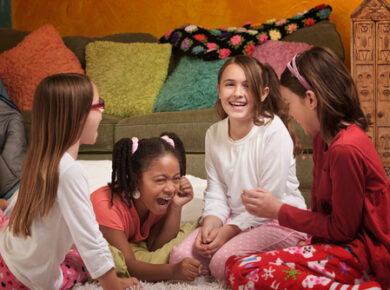Homeschool Socialization

One of the main fears of parents considering homeschooling is “Will my children be well socialized?” And if you were homeschooled, as I was, the first question people probably ask you is “How did you get socialized?”
What is socialization, and why is it important?
When we talk about “socialization,” we’re talking about the ability to be in society with others—“socialization” comes from the word “society.”
Growing up, children learn many socializing behaviors that make them better members of society. Some of those behaviors are obvious, like being quiet in church or the doctor’s office. It’s likely you’re not concerned about these basics but rather about more subtle things like communication skills—whether your child will be able to build strong relationships or work closely with others in the future.
I completely understand the concerns. In traditional brick-and-mortar schools, a lot of socialization happens naturally. But just because homeschooled children are learning one-on-one or in small group settings doesn’t mean they aren’t gaining critical social skills. As you’re planning your homeschool framework, it’s important to understand the socialization opportunities available to you and your family and find groups, activities, and other families who align with your goals and interests. Here’s how to get started.
What kind of socialization do we want?
When planning socialization opportunities, it’s important first to consider what kind of socialization your child will receive. No, you can’t recreate a public school social experience for your child—nor should you. In public school, children learn how to interact mainly with their peers. This takes enormous mental and psychological energy for most children, as there are so many distracting forces:
-
-
- How can I be accepted?
- Everyone else is misbehaving. Do I join in, or risk being ostracized?
- Do I show my genuine interest in what the teacher is saying, even though it isn’t popular to want to learn?
-
Even in parochial schools, children are caught in this peer approval dynamic. As a result, their education and character growth are often compromised. Children may learn how to please their peers, but is that really healthy socialization? As a homeschooler, you have the opportunity to give your child a healthier social life.

Homeschool’s broader socialization opportunities
Homeschooled children have a much wider range of socialization opportunities than public school children. Instead of interacting with just their peer group, homeschooled students interact with all age groups. Rather than being forced to conform to the values of a school-based peer group, your child can form his own friend groups based on similar values and interests.
You may be thinking, “But how do we find these like-minded children?” As homeschooling becomes more and more mainstream, opportunities abound for a great homeschool social experience. Most homeschoolers have access to:
-
-
- Homeschool groups—and if you can’t find one that aligns with your wants and needs, consider starting your own group
- Homeschool co-op classes
- Extracurricular activities, such as sports, a student orchestra, or 4H
- Your local parish
- Volunteering or educational work-study in the local community
-
If you live in a very rural area with no homeschoolers, consider periodically driving to an area that offers these opportunities. Homeschooling frees up a lot of time that in-school children don’t have. Use that time for purposeful social engagement. Don’t overdo it, but try to commit to one or two extracurriculars that have a good group of children involved.
A note on being different
Let’s face it: a big part of the socialization concern is the issue of being different. No doubt you remember how painful it was to be unusual or feel different as a child or young adult. Naturally, we worry that if our child is too different from his peers, he’ll be ostracized and lose confidence.
The reality? Virtually every young person feels uncomfortable growing into his or her identity. But the real answer to this problem isn’t simply blending in or conforming to avoid standing out or being noticed—what often happens in public and private schools. Rather, you want your child to have the courage to be who God made him to be and not let others tell him who he is or should be. Homeschooling parents have a unique opportunity to help their children mature into godly, compassionate, humble, and confident members of society instead of watching their children be conformed to the image of the world.
With some planning and an eye on opportunities to socialize with others, you can strike that balance—ensuring your child has the confidence and clarity he needs to go out in the world and make friends, form meaningful relationships, and contribute to society, while at the same time ensuring he doesn’t feel the need to fall in line with whatever his peers or classmates are doing. This is the ideal—and it’s something homeschooling parents can uniquely promote and support.
About Esther Moon
Esther Moon was homeschooled and could usually be found reading a book when she wasn’t building tree forts. On some of her adventures, she explored ancient Egyptian tombs; earned a B.A. in Politics, Philosophy, and Economics; taught Shakespeare in Italy; and completed a Ph.D. in Literature at the University of Dallas in 2022. She is the co-author of My First Treasure Trove of Literature.
Related Blogs
If you enjoyed this article, you might be interested in the related articles below.
Favorites
Explore CHC’s top favorites! From art to literature, science to hands-on religion, CHC has materials to enrich every Catholic homeschool.



















